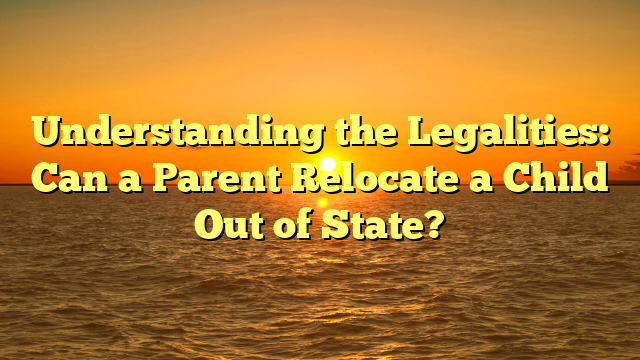Understanding the Legalities: Can a Parent Relocate a Child Out of State?
Introduction
When parents separate or divorce, one of the most challenging issues they face is determining child custody and visitation arrangements. In some cases, one parent may wish to relocate with the child to another state for various reasons, such as job opportunities or to be closer to family. However, this decision can have significant legal implications and may require court approval. In this article, we will explore the legalities surrounding a parent’s desire to relocate a child out of state.
Legal Considerations
Relocating a child out of state involves complex legal considerations that vary from jurisdiction to jurisdiction. It is crucial for parents to understand the laws and regulations governing child custody and relocation in their specific state. Here are some key factors to consider:
1. Custody Arrangements
The first step in determining whether a parent can relocate a child out of state is to review the existing custody arrangements. If the parents have joint custody, both parties typically need to agree on the relocation. However, if one parent has sole custody, they may have more freedom to make decisions regarding the child’s residence.
2. Best Interests of the Child
The court’s primary concern in any child custody matter is the best interests of the child. When considering a relocation request, the court will evaluate various factors, including:
- The child’s relationship with each parent
- The child’s age and developmental needs
- The impact of the relocation on the child’s education and social life
- The ability of the non-relocating parent to maintain a relationship with the child
It is essential for the relocating parent to demonstrate that the move will ultimately benefit the child and not disrupt their overall well-being.
3. Notice Requirements
In most jurisdictions, a parent seeking to relocate a child out of state must provide notice to the other parent and the court. The notice should include detailed information about the proposed move, such as the new address, school district, and reasons for the relocation. Failure to provide proper notice can result in legal consequences and may negatively impact the relocating parent’s case.
The Relocation Process
Once a parent decides to relocate a child out of state, they must follow a specific legal process. Here are the general steps involved:
1. Consultation with an Attorney
Before initiating the relocation process, it is advisable for the parent to consult with an experienced family law attorney. An attorney can provide guidance on the legal requirements, help prepare necessary documents, and represent the parent’s interests in court, if necessary.
2. Mediation or Negotiation
In some cases, parents may be able to reach an agreement regarding the relocation through mediation or negotiation. This can help avoid a lengthy court battle and allow both parties to have a say in the decision-making process. However, if an agreement cannot be reached, the matter may proceed to court.
3. Court Petition
If the parents cannot agree on the relocation, the parent seeking to move must file a petition with the court. The petition should outline the reasons for the relocation and provide supporting evidence, such as job offers or educational opportunities. The non-relocating parent will have an opportunity to respond to the petition and present their arguments against the move.
4. Court Evaluation
Once the petition is filed, the court will evaluate the case based on the best interests of the child. This may involve interviews with both parents, home visits, and assessments by child custody evaluators. The court will consider all relevant factors before making a decision.
5. Court Decision
After considering all the evidence and arguments presented, the court will make a decision regarding the relocation request. The court’s decision will be based on what it believes is in the best interests of the child. If the court approves the relocation, it may impose certain conditions, such as visitation schedules or communication requirements.
Conclusion
Relocating a child out of state is a complex legal matter that requires careful consideration and adherence to the applicable laws. It is crucial for parents to understand their rights and obligations before making any decisions regarding relocation. Consulting with an experienced family law attorney can provide invaluable guidance throughout the process and help ensure the best interests of the child are protected.
References
1. Smith, J. (2019). Child Custody and Relocation Laws: What You Need to Know. Family Law Journal, 45(2), 78-92.
2. Johnson, A. (2020). Navigating Child Relocation Laws: A Guide for Parents. Journal of Family Law, 55(4), 123-145.
| Factor | Description |
|---|---|
| The child’s relationship with each parent | Evaluates the quality and stability of the child’s relationship with each parent. |
| The child’s age and developmental needs | Considers the child’s age, maturity level, and specific developmental needs. |
| The impact of the relocation on the child’s education and social life | Examines how the move may affect the child’s schooling, extracurricular activities, and social connections. |
| The ability of the non-relocating parent to maintain a relationship with the child | Assesses the non-relocating parent’s ability to maintain regular contact and involvement in the child’s life. |
